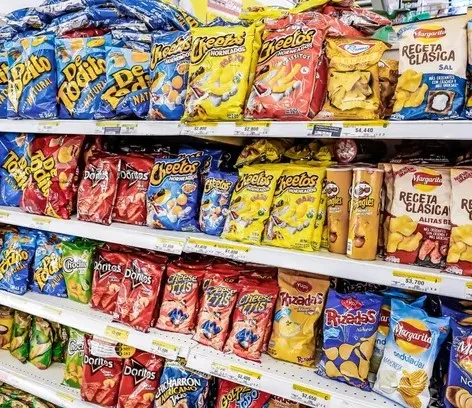Colombia’s new junk food tax, the toughest in Latin America, draws both outrage and support
By Weronika Strzyżyńska and Iñigo Alexander
“Instead of eating a bag of crisps or Cheetos, I’ll go to the fruit section of the supermarket,” says Liliana Cano, a 43-year-old shopper at a supermarket in Bogotá. “But sometimes I still have a soft drink, as a little treat.”

Shopping for groceries at a supermarket in Cucuta, Colombia.
Colombia became one of the first countries in the world to tax ultra-processed foods earlier this year. The ambitious new health measures, aimed at reducing the burden of non-communicable diseases such as cancer and diabetes, also include warnings carried on foods high in sugar, salt and other additives.
Like many low- and middle-income countries, Colombia is seeing an increase in the burden of non-communicable diseases, which account for an estimated 76% of all deaths in the country. On average, Colombians consume 12g of salt a day, the most of any country in Latin America. Nearly a third of adults have high blood pressure.
The additional tax of 10%, which is planned to increase to 20% by 2025, is levied on unhealthy snacks and soft drinks, as well as some staples, such as processed meats.
A month after introduction of the measures, shoppers in Bogotá are beginning to feel the impact. “Everyone knows that a high amount of sugar or sodium is bad for health, so it’s a good idea to increase the tax on those products. But eating healthily is expensive,” says Cano. “The tax affects us in a tremendously unfair way,” says Hectór Cruz, a 45-year-old shopper at the discount supermarket D1. “I agree that they should tax products like soft drinks and beers, but not staples.

Cheetos and other snacks for sale in Cartagena Colombia.
“Of course, you would like to consume a healthy product with good proteins and minerals, but the unemployment rate is high here, and the economy is weakening,” he adds. “So, people who maybe haven’t had breakfast or haven’t eaten anything by midday will just buy a bag of crisps for 3,000 pesos [60p].”
Arne Dulsrud, a sociologist at Oslo Metropolitan University, says: “I don’t think that the tax itself will increase the nutrient consumption of Colombia’s poorest.” Dulsrud, with a team of researchers from Norway and the Pontifical Javierian University in Bogotá, has conducted a large-scale study on food insecurity in Colombia’s conflict-affected south-west Cauca province. “We found that even people in rural areas who have access to kitchen gardens or crop cultivation do not eat their crops but sell them on the market,” Dulsrud says. “They use this income to pay for school expenses for their children and to buy cheap food with lesser nutritional value, which is often highly processed.”
Even food packages distributed to Colombia’s poorest families as part of a government program are full of processed food, Dulsrud says. “Tax can be one element of increasing consumption of healthy foods, but I think health reform would have to focus on the most vulnerable to be effective,” he says. “Introducing healthy meals to schools can be one way, land reform is another.”
Land ownership in Colombia is one of the most unequal in the world. More than 80% of the country’s productive land is owned by 1% of farming businesses, according to the Columbia Human Rights Law Review. “If the government is looking for sustainable long-term policies for food security, they should do something about land access,” says Dulsrud.
Cruz agrees that warnings on packaging are largely a good thing, but he is not convinced it will change the way he eats. “This is actually the product I could find with the least warning labels,” Cruz says, holding up a packet of crisps from his shopping basket. “Practically all these products are giving us cancer and we know it, but what can we do with our budget?”
“The price of healthy alternatives is an issue,” says Guillermo Paraje, an economist at the Adolfo Ibáñez University in Chile, a leading researcher on health taxes in Latin America. However, he disagrees that Colombia’s new tax is regressive or puts poor people at a disadvantage.
“You have to consider the whole package, not only the financial impact of the tax, but also the impact of illnesses caused by unhealthy food,” Paraje says. “In Latin America, as in most parts of the world, the poorest are most negatively affected by illnesses. They have poor access to the health system and many are employed informally and don’t have protections such as sick pay.”
But not all Colombians are troubled by the price of healthy choices.
“I think you should pay a bit more to eat healthy,” says Carlos Martínez, 54, a shopper at the high-end supermarket Carulla, known for its quality fresh produce. “In fact, look, I just bought healthy crackers, fruits and vegetables. The health warnings are working.”
___________________
Credit: The Guardian





















